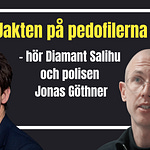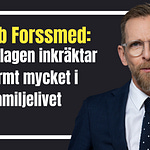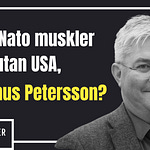(This is a rebroadcast of a paid podcast episode from March 19th last year, which I now have made accessible to all. Hope you’ll enjoy!)
When Douglas Murrays book The Strange Death of Europe came out in 2017 I started recommending it to basically everyone I knew. Some of them, quite a lot of them actually, came back to me and said that they now saw the world in a different light. But they were also so disconcerted that they sometimes asked me to present a solution, since I was guilty of leading them down this path. What is to be done, Ivar?
So today I’m putting that question to the author himself. He’s one of the foremost thinkers and writers of our time, and that’s not an exaggeration. He followed up The Strange Death of Europe with The Madness of Crowds two years later, which focused less on migration and islam, and more on the cultural issues afflicting us, centered around identity politics.
And last year he came out with The War on the West which is what we focus on in today’s conversation. Why is the west waging a war on the west? Why are we so preoccupied with feeling guilty over things that we fail to notice our achievements? How did antiracism become so racist? When did much needed self-criticism morph into abject self-flagellation?
Below you can read the transcript of interview with Douglas Murray, for those of you who prefer that over listening to podcasts.
Welcome, Douglas Murray, to Rak höger!
– Very good to be with you!
It's an honor to have you on! One of the reasons I've been very keen on having you on is because your books really are some books I recommend as I said before in the monologue. The latest one is called The War on the West and it came out a year ago and it really ties into the book you wrote before which was The Madness of Crowds and it sort takes it a step further. What is the War on the West and why did you chose choose that title?
– Well, in in a number of recent books, as you say, I've been sort of groping towards what's going on in our time. In The strange Death of Europe I addressed the question of immigration and integration in the West, in particular in Europe. And this is obviously a subject which Swedes know very well, the challenges around. One of the things that I recognized that comes from mass migration and the great changing of a society is the identity of society changes. You might like the direction of change, or you might dislike it but it's pretty hard to argue against the simple proposition that if the people in the society changes, the society changes. One of the ways in which our societies have changed has been that we've had to change our guiding ethos and in my last book The Madness of Crowds, I looked at one of the things that is a changing ethos which is the way in which the public religion of our time has come to do with identity and what has become known as identity politics, obsessions with LGBTQIA+ issues, obsessions with women and the place of women in society and obsession with race and other identity related issues. These have become the dominant issue in our in our societies.
– I addressed that as I say in The Madness of Crowds but there was an element of it that I had not addressed and which I wanted to address and did in in my most recent book in The War on the West,
which is that in order for this to happen, it appears you also have to wage war on what we had in our societies. So to wage war on everything in our past to effectively presume that everything that happened in the past was bad and must be lambasted and criticized. In America, and we're all downstream these days, like it or not from American culture, in America this focuses on the idea that America has an original sin which is the sin of slavery. I don't deny the evils of slavery but it's a very s trange way to talk about it because of course, if America has original sin, is it the only country that does? Do other countries have original sins? What's the original sin of Uganda for instance? We in Britain and in Europe have ended up imbibing our own version of this and it comes in the form of anti-colonialism. The idea that for instance colonization is the original sin of Europe. In an obsession with slavery and any benefits that our society has had from that and in a third thing as well which is racism. Look at our societies and look at them through the prism solely of racism. Again, racism is a part of our past but it isn't the sole lens to look at it through and yet that has become the case.
– I say that this has become a form of western anti-westernism and that's really what I write about in The War on the West. There are different types of anti-westernism, there is arab anti-westernism, there is Chinese anti-westernism and these are very interesting and important subjects themselves but the most important and the most dominant form of anti-westernism in our time is I believe Western anti-westernism and that's really what I write about in this book. The West's hate for its own past.
When you read your book, it seems like there is a profound lack of curiosity about the actual inheritance and history and the people whose ideas have dominated or influenced our cultures for such a long time, to understand them and put them in their in their proper historical context, to understand where we come from.
– That’s right.
I've been talking a lot about Christianity in this podcast lately I've interviewed Tom Holland, Paul Kingsnorth, Per Ewert and David Thurfjell on the subject and so much of that knowledge about the Christian heritage for example, you can just brush it over. Now in school, it's just one religion out of many and why should we learn more about that than others the other great world religions? I'm not sure if you share the sentiment? My own perspective is that if you're going to criticize something you better learn a lot about it and then you take it apart.
– Well, but why would you have to learn and anything if you thought you already knew everything? Um I mean that's what's really happening. If you believe that everything that's gone wrong in the world is our fault in the West, you don't need to educate yourself about the rest of the world and you don't really have to educate yourself about your own past because you've already got this monomaniacal view of it, this single lens through which you need to look at everything, believing that everything was bad and that's all you need to know. Whereas to be informed, you would need to at least know the pros and the cons, the upsides and the downsides, the virtues and the vices. For instance, if you were to be interested in the historic subject of slavery, you would need to know both the ways in which it was done, the people involved, including the African nations involved and you would also have to know that it was the West that actually abolished slavery and how that came about including the Christian religious impulse, the Christian campaigners who brought it to an end.
Perhaps my listeners know about that part, but it's not well known. That's one of the things that people are not so curious about, why did the West abolish slavery and Britain in particular?
– Yes, it's a very interesting subject. Slavery has been a consistent throughout human history, almost every civilization we know of engaged in some form of it, it was the norm. First of all, principally, I hate that it makes me sound jingoistic, but when the British abolished slavery in the Nineteenth century, it was largely done through a moral argument whose moral force became impossible to resist, and the moral forces came from a Christian idea of the sanctity of the individual and that this sanctity applied to everyone, that everyone was equal in the eyes of God and that man did not have the right to enslave his fellow man. The moral force of this argument made by people like Wilberforce and others, as I say became impossible to resist and became so impossible to resist that actually slavery fell apart within a number of decades. It didn't fall apart simply through natural causes or from the force of that argument. It also stopped because the British navy patrolled the high seas and forcibly stopped vessels transporting slaves, for instance to Brazil which tried to continue slaving until the 1880s. So it was not simply through a force of moral argument but the initial impetus to ban slavery, to ban it not just in the British empire as it then was but around the world, undoubtedly had a Christian fuel behind it. That's a very important thing to recognize. There’s another one that perhaps is more complicated morally, which is the Christian realization that was at the root of a form of colonialism, certainly in the age of the explorers existed, when Columbus and others set out, Columbus in particular and accidentally discovered the new world. One of the interesting questions that arises is what the natives in these places were and if the West had approached them in the way that many people think, among other things no missionary would have set out. It was the inside of European explorers, that said these people are like us. That's obvious to us today but it wasn't obvious at the time. Many other civilizations would have taken a contrary view. But the moment that people realize these were people like us, people with immortal souls, to use the language of the time, then of course the missionaries set out. And the missionaries would not have set out if these were not recognized to be, as it were, equals.
While Britain was fighting Napoleon, the British parliament passed the act of the abolition of the slave trade in 1807. The argument is that it was the “white savior complex” and all that, and that's part of it maybe, but it was also the case that it was at a great cost that the British Empire did it. They fought a lot of wars to abolish the slave trade.
A friend of mine who has roots from Africa was talking about slavery and colonialism on a panel a few years back. He said “most of you guys who are here are white, so you have sort of inherited a sense of guilt for the slave trade but my family actually owned and sold slaves for centuries and we only stopped because the Britons abolished the slave trade. That's the reason we stopped, so I have an actual inherited guilt from my family. But since I am black, I have the upper hand towards you, even though most of you were potato farmers until recently”.
But that kind of argument is too complex. It's interesting that you're actually not interested in how these quakers, other Christians and British politicians like Wilberforce argued – that there souls were worth the same – they were part of the common humanity.
But like you say, there seems to be a western war against the West and it's hard to understand why.
– I’d say that the why is partly because it's so simple. It's so straightforward. It's such a simple narrative. The reality is complex the reality for the real story you have to know more? It would be absurd to for instance, look at the history of Africa and look at it solely through the lens of racism and slavery. You could do that but if you did, I think people would recognize you had a certain animus against the peoples of that continent. I think it's the same with the anti-westernism. I think there's an animus against the West that is revealed in this, that you're obsessed with this aspect of our past suggests that you have a problem with the West as a whole, because you want to focus only on the bad. If you did that with anyone, I think people would question your motives they would say why? Why can't you understand us in the round? Another example of that animus is something you mentioned in passing there. Phrases like “white savior complex”. This is a lose-lose situation that's been deliberately set up by people who I believe are simply antagonistic towards the West and its history. The lose-lose situation is if you've done something bad, you're blamed and if you do something good, you're said to be for instance, a white savior. What way out is there in this? The answer is none, it's a trap – don't fall into it. Anyone talking in that kind of language is inviting you to fail.
One hundred years ago, if you look demographics a much larger portion of the world's population was living in Europe, and what we define as the West was much more powerful in all measures. If the great powers of Europe decided something, the rest of the world had to obey or fight and probably lose. Now we're in a situation where that's not the case anymore, I would argue. The West has declined to a large degree. China is a rising power and we have challenges to western power throughout the world. Is this guilt felt by the West a backhanded way to keep our self-image as powerful? That everything is our fault?
– That’s part of it. I would argue that one of the virtues of what has become known as the West, is self-criticism. I think is a vital part of the West's success economic, military, social and much more, is the desire to improve, the desire to hear arguments against yourself in the hope of getting better. That's not by any means a universal virtue, there are many societies around the world who have not engaged in that kind of self-criticism. I think that has an effect on the society itself. However, the problem of self-criticism is that it itself can get into overreach. And it gets into overreach and moves from being a virtue into being a vice, when it moves from self-criticism to self-laceration and then to self-loathing.
– Some of the questions that has occasionally come up since The War on the West came out, has been people who said to me “How can you tell when a society moves from self-criticism to self-laceration to self-destruction?” I said well, it's in the same way that we all can tell it in our own lives. We've all developed an ability to distinguish between critics who wish us well and critics who wish us ill. I think everyone listening has had the experience in their own lives of hearing from people who criticize them in order to help them and people who criticize people they dislike. If someone who I knew loved me gave me advice, I would listen. If it was somebody who I knew loathed me, I think I'd be less likely to. How can I tell the difference? It's not hard and I don't think it's that hard in a society either. If somebody starts talking about original sins of your society, of guilt that is ineradicable and solely yours, who speaks in terms of “white savior complexes” and much more, you're dealing with somebody who doesn't want to improve you. You're dealing with somebody who wants to end you, who loathes you, loathes your society. That is not a hard thing to identify. It's there in all the language that is being used and in the campaigns that are being fought.
One of the most concerning things about especially the English-speaking countries is the woke takeover of institutions, such as universities, the media and elementary schools and even the business world. You talk about this in your book, the critical race theory and what it says. The most popular books on the subject are bestsellers and they're being recommended in bookstores even here in Sweden. Of course more widespread in the United States and probably in in the United Kingdom as well.
How can theories that are so counter to what we who are a little bit older, grew up to believe was anti-racism – namely colorblindness – and now it’s the opposite. And not just the opposite – there is no good way to be white for an author as Robin DiAngelo and Ibram X. Kendi goes even further than she does. How has these extreme theories gotten such a hold of our societies?
– One explanation is that we're living an age of over-correction and this is the most benevolent and interpretation that I can give. Over-correction is something I addressed in The Madness of Crowds in relation to social issues. Nobody can deny that historically women had fewer opportunities than men. That's something that almost everybody in our societies today wishes to rectify. But there is a group of people who do not want to settle on equality between the sexes but want to as it were make up for lost time by over-correcting and socking it to the men for a while. To say, well, women were prejudiced against in the past so let's be prejudiced against men for a time. Over-corrections like that seem to be pretty common in our societies in this century. Trying to make up for historic wrongs, perceived or actual, by overcorrecting in the present. The most striking version of this is the one that you just referred to. Again, nobody can deny that historically and to some extent today, that racism exists. It's one of I think a number of human evils which we should all be aware of and as I say try to resist. The settlement we had broadly come to, as you say when some of us were growing up was colorblindness as an aspiration, which is to get to the point as my friend Sam Harris has put it, that skin color would be as unimportant as hair color for instance.
– Again, there seem to be people who wish to go through an over-correction. They wish to say because in white majority societies as ours in Europe, there has been prejudice against black people in the past, we must rectify that in the present not by equality but by socking it to the white people for a bit by being unpleasant to the white people for a time. This is I believe a completely suicidal route to go down for many reasons. One of which is that you are warring against the majority in your population, and I don't think that's ever a recipe for success. But nevertheless, it's the vengeful period that we are in, in which things are said about white people that wouldn’t be tolerated if they were said about other people. You quoted the appalling Robin DiAngelo, she says as you say that there's no good way to be white. Just flip that around and imagine how abhorrent it would be and how appalled we would all be if Miss DiAngelo or anyone else said there's no good way of being black, or there's no good way of being Asian. It would be appalling. This would be identified quite rightly as racism. Well, it is and should be identified as racism in this case too. It's quite appalling the tone in which people like Kendi and DiAngelo and others are allowed to talk about whole races of people. I'm amazed they've got away with it but they certainly have so far and I want them not to. There's a book by a professor in America called Colorblind Racism that asserts that the very principle of colorblindness is itself racist. That again gets you into this lose-lose situation.
I think that's brilliant, even trying to stop seeing race – that's also racism. There’s no escape.
– No escape. They've barred all of the exits while setting the house on fire. That's what these people have done and it's one of the things that I'm calling them out for in The War on the West, and what I want to identify for readers as a major challenge that we have to address.
We have people like me who perhaps have an ideal of colorblindness and integration and then you look at what’s going in the Swedish institutions. Here race is not as prevalent, but gender and sex and trans issues are. The mix is the same but it's just…
– You have slightly different emphases.
Yes, exactly. But then you start to think that “hm, if we are the only ones upholding the liberal principles of equal treatment, meritocracy, non-discrimination, and the other side are fighting tooth and nail to have their candidates on the board or their policies enacted, then we’re going to lose.” I myself remember the first time I really reflected on me being white because for me, it was like an American phenomenon that you could see on television, and it was it was not that long ago. I think I was reading in the sociology class and somebody said it and I was like “Okay, so I’m not just an ethnic Swede, I'm white. Of course there's a biological core to some of these concepts but they are also socially constructed and then you start to identify with them and then they become a reality for people. That’s something that has happened quite late in Sweden. I know Eric Kaufmann has written about this in Whiteshift and I've had him on. He said “If other groups are waging identity politics, the majority has a right to do it themselves”. What's your take on that?
– My own view is that this way lies hell but it might be unavoidable if people keep going the way they're going. I don't want to identify by my skin color and I don't. If you were to say “Douglas, how do you think about yourself?” I would first of all say “I don't, very much. I don't sit around pondering.”
That's refreshing!
– I know, I don't sit around pondering myself. But if you say “Who are you?” or “How do you identify yourself?” I'd have an awful lot of things to say probably, starting with “I'm a writer”. But I don't think that at any point, or at least it would be quite a long way down the list, would I say “I'm white”. I don't think it would actually be in my list particularly. I just don't like to think of myself in that way and I think most liberal minded people, for want of a better term, people in the West, also don't want to think in those terms. They don't want to be made to be white. It's reductive, it's got all sorts of implications. But if you push people endlessly, that might well be one of the places that they will go to. Eric Kaufman says it's a sort of legitimate understandable endpoint in this. I agree with the provision that I think that it's a very undesirable endpoint. I don't think the re-racialization of society is a desirable thing but it's certainly something that is going on. I don't want people to be pushed into identifying in this way. But I say at the end of The War on the West, I give an example of the options that are available and anyone who reads the conclusion to the book will see that. Rather stark way in which I lay this out.
One of the things that's at the core of your three latest books that we’re mainly talking about, is what is the West and why is it worth defending? The Strange Death of Europe is a very somber book in a lot of ways. It’s in the title, that Europe is killing itself in a lot of ways. One of the main arguments that you have in the book is that Europe itself has lost faith in its beliefs, traditions, and legitimacy. That's also what you explore in The War on the West, how Europe is not even legitimate in many people’s eyes. Why is it worth defending then?
– My own belief is that it remains worth defending because it's still, by long way, the best of all available options. If you look at the alternative dominant systems in the twenty first century, I think all of them are infinitely less desirable than the systems that exist in what has become to be known as the West. I don't believe that for instance, the Chinese communist party's vision of the future is a desirable one, it's certainly not one I would want to live under. But it is an alternative scenario in which a degree of financial opportunity exists. a very minimal but a degree of it, and in which personal freedom is not regarded as being of any particular, significance. The things that we take for granted, like personal liberty, like human rights, and again, some people think this is a shocking thing to say but nevertheless it remains true: These are Western concepts, the Western constructs. And they are things that came from the West. People might wish to argue that or resile from even asserting that, but nevertheless it remains true. Anyone who actually cares about some of the subjects we've been discussing ought to reflect very seriously on whether or not they are in their critiques of our societies, not engaging in that fallacy. Immanuel Kant famously gives in the example of the dove that flies in free air that may mistake the resistance of the wind and think that in the absence of this wind, it would be able to fly faster when in actual fact, the wind is what keeps it up.
– Another analogy would be the fish that believes it would swim faster if it weren't for the water. Perhaps there are a lot of people in our societies who are making this fundamental category error of thinking that if it weren't for the system that is around them. They would be going so much further and faster, and I think this is a delusion. There are certainly things that we can improve in our societies in the West, but the idea that the whole system itself needs replacing is a very serious mistake to make, because as I say the alternatives are highly undesirable.
I know you were in a panel with Tom Holland and you spoke about the role of Christianity. And you were a friend of Christopher Hitchens and you've described yourself as a reformed Anglican turned atheist and but in that debate, you didn't sound triumphant so to speak. I know Tom Holland himself says that he sort of wished he could go the whole yard, but he recognizes the role Christianity has played in the West and I think this is a more and more common recognition by public intellectuals such as yourself, that maybe we've emphasized enlightenment, philosophy, liberalism and that part of our tradition too much and paid too little attention and given too little credit to Christianity. Now that our societies are more and more secular, or at least the majority populations are, then the question is: Is there a core missing here? Of what it means to be a Westerner?
– Yes, I think there is and it's something we've seen in the last twenty years in particular. I think one of the results of 9/11 was a form of strident atheism that that found for instance, and I was a part of this, but found that one of the ways to criticize growing dominance of Islam in our societies, was to criticize religion as a whole. I think that's one of the things that went on in the 2000. Although in the case of Islam that remained difficult to do, in the case of Christianity, the atheists were pushing at a pretty open door. It was already fragile. I think that, without in any way speaking for my late friend, I think that one of the things that's happened in the last ten years, has been a greater reflection which you can see in the work of Tom Holland and others, a greater reflection on what you just laid out. Yes, part of our inheritance is enlightenment, part of it is reason, rationalism and the inheritance of ancient Greece and much more. But it is also the inheritance of Christianity. Twenty years ago, that seemed to be a slightly harder thing to assert than it is now. I think that the work of for instance Larry Siedentop, distinguished political philosopher who wrote a book some years ago called Inventing the Individual, without in any way being a dogmatic Christian himself, Larry Siedentop proves that concepts that we take for granted as the water we swim in, are to a great extent of Christian inheritance. People might like that or dislike it but it's the case whether you like it or not and we need to have a truthful understanding of ourselves and not one based on falsehoods that we just happen to enjoy.
One argument that's been made is that what we call woke, which is a broad term but it's an umbrella term and it incorporates many of the things that we've been talking about, CRT, LGBTQ-issues, trans rights, diversity – it's also a view on power, who are the powerful, who are the powerless. But that is the god-shaped hole that's left behind by Christianity and woke moves in there and it gives you structure to the world, to your place in it. And it also has some of the concepts, like guilt, original. You could see these scenes from after George Floyd was killed by that policeman, you could see the scenes of white people washing the feet of black people. It was sort of a Christian tradition, but it also was not.
– Well, here's the thing that's not. I agree with the observation, I regard a lot of these modern social movements as being forms of spilt Christianity or residue Christianity which the people engaging in it don't recognize and would be quite annoyed by if told this. Nevertheless, as you say very visible, recognizable aspects of Christianity are interwoven in this. But here's the difference and here's the fatally important difference: What is being offered at the moment is a form of secularized Christianity, without any ethic of redemption and that is dangerous. Very, very dangerous. The great brilliance of Christianity is the concept of redemption. The possibility of successfully atoning for sins. Take away the possibility of successful atonement, and all you have is a perpetual cycle of guilt and I believe that is what underlies a lot of the unhappiness in our societies today. Ok I'm told I'm evil, evil from birth. I'm told I'm guilty from Birth and I'm told that my very existence is some kind of insult or assault on the planet, that's part of the green movement, how my very being here is part of the problem and there's no way out other than to live a life of complete innocuousness or harmlessness. That was something that Jordan Peterson and I have discussed in the past and indeed I raised with Roger Scruton in what was sadly his last public appearance. Roger and I discussed this as well, this idea that harmlessness had become the great modern virtue that you were meant to slip into this world and slip out of it without having made any mark, certainly done no harm. This is a highly demoralizing stage of affairs to be in, but it is a dominant one that is being pushed on people. I don't like it at all, I want people to be extraordinary and successful and innovative and much more and I don't want us to live lives of thwartedness, of repression, of guilt without redemption. I think it's a hideous system.
Sometimes there has been this criticism against Christianity, that it’s too easy…
– Well, they haven't tried it hard then.
No, exactly and that you just go to confession in a Catholic…(this is my Swedish Lutheran upbringing here) You just go to confession…
– Yeah, I was going to say that's recognizably protestant critique of Catholicism. But real forgiveness in the Christian sense is an awesome thing to behold when you really meet it. A few years ago, to cite a pertinent example, here was a white American youth who went into a black church and shot at congregants and killed a lot of them and it was a hideous crime of a kind that is uncommon, but happens.
And his motive was to kill black people.
– Yes. And some of the families of the people who were murdered said that they did not hate the killer, they forgave him. That's almost beyond my comprehension. I'm overwhelmed with admiration for anyone who could even aspire to such a state of grace actually took for want of a better term, perhaps there isn't a better term. So actual forgiveness, in the Christian sense, is an awesome thing to behold when it when it is actually exercised and should not be taken lightly.
In this new woke religion, this is totally lacking. There is no way out so to speak. Your mere presence, if you have certain characteristics, being white or having a certain sexual orientation, destroys the fun for everyone.
– That’s also part of the victim hierarchy, the aspiration to victimhood which again I have very little sympathy with because I believe that our lives can be much better than simply trying to be victims. hat. It is one of the anomalies of the last generation, that we have moved the public ethic from an admiration for heroism into an admiration for suffering and what it means is a scramble to suffer or to claim suffering. Nobody actually wants to suffer but they want to claim to have suffered, and because to do so is to have the right to hold the microphone. But yes, what you describe correctly is a situation which we find ourselves in in Western societies, is what a chess playing friend of mine tells me in chess is known as “Zugzwang” which is when you have to move but every move will make your position worse. That's the position we find ourselves in and it's one I want to break and I'm very explicit about that. I believe that this system that we're describing, the anti-westernism and the wokeness and much more, it is a system that we should aspire to break in order that people can move on with their lives and move on to better things.
I think that the conversations you've had with Jordan Peterson and Roger Scruton about being harmless, is certainly true about boys and men in our culture and you're very scared about masculinity and you're scared of men, and you have to keep them down. I would like to hear your thoughts about that and if there is a way out of it? And also, we’re having a small MeToo-moment here where a politician has been accused by a member of his party for touching her thigh and not respecting her nine years ago. I suspect that he will be gone from the public eye and there's no way back for him. There’s been a criminal charge now but I don't think it will pass the court law. So the first question is, is there a way out of pathologizing men and the second is what is the legacy of MeToo?
– I address the overreach of MeToo, which I think was an overreach, an overcorrection. I address that in The Madness of Crowds. I believe you should not make all the interactions between men and women a sort of minefield that we've made them. Men can do terrible things to women, but they don't do it all the time and not everything is terrible. It should be possible for a man to make an advance from a woman and be rejected and for that to be the end of the matter. Again, there has to be a way to have a bad date for instance, men should not be in a society set up in such a position as they have the opportunity to make one move once on a woman and it has to be 100% successful and they have to hit the bull's-eye on the first throw, and this has to be the person they marry and so on. I'm afraid that everyone who knows the dating game knows that that's highly unlikely to happen. Mistakes are going to happen, and you have to have a reasonable view towards that, which includes forgiveness and moving on and much more That's quite different from when somebody behaves genuinely badly, but I believe all of this has been wrapped up in this into being the same thing and it's very dangerous because it makes relations between the sexes all but impossible and somebody who would like our species to continue I think that men and women have to be able to find a way to get on.
I did the mistake of trying to ask two questions in one, but this ties into the first question I tried to ask. We also have a quiet new consent law in Sweden so you have to prove that you had consent instead of proving that you said no if there's a situation with an accusation of rape or something. You have to take a step back now as a man out of precautions, and as a young man because they are of course looking for a partner. What can be done about the situation for men right now because I think we have put them in quite of a bad situation and there are a lot of debates in Sweden about how first you ridicule men because they're too soft, I've certainly sometimes been guilty of that, and then you ridicule them or are angry with them when they try to be tougher and you ridicule men who are sensitive and vulnerable because they take too much space and attention from people who deserve it more, women. And then if they're too hard and don't show any feelings then they're toxic. So how can you solve this?
– Exactly, it’s not a good time to be young and heterosexual. I believe this this all has to be addressed and solved because otherwise…all of the stats, all the data shows that an increasing number of young men in particular are basically stepping out of the whole system. The evidence on the number of people who've had sex in the past year and so on, shows an increasing tendency towards young men basically stepping out of the system, thinking it's just all too difficult, too toxic and giving women a very wide berth. Again, I think this is a creation of a form of feminism which those people who created it will live to regret or the least the people who come after them will live to regret. It has to be solved.
I just visited Åland which is an island between Sweden and Finland, thirty thousand people live there. I was giving a lecture with my college Anna-Karin Wyndhamn and we spoke about these issues. The same day we were there, they were debating to vote through a law that will have gender neutral pregnancies. So… why? Why is a tiny island in the north where many of the questions concern practical issues, dealing with this? All of a sudden, the most woke things are being debated in their parliament.
– That’s the story of our era and it has happened everywhere, and I don't care for the people who underestimate it, it seems to me that they haven't left the house very much in recent years. It's everywhere and it's a great waste of time and energy. My goodness, there are so many other things that are more important to be getting on with, so many bigger challenges that are literally on our doorsteps.
Do you feel like you're wasting your time then, because you've written brilliant books, but they are about stupid people?
– My hope is that I help to clear them out of the way, one of my self-appointed asks is to clear these people out of the way help my readers clear these people out of the way in order that people can get on to doing what they should be doing with their lives. And that's really what I want to do and if I have any success in my life, It'll be in in helping people to do that.
Thank you Douglas Murray for being a part of Rak höger.
– It’s a great pleasure. Thank you.
Inför varje podd…
Tack för alla inspel inför den här podden. Som ni hör i avsnittet så är det till stor hjälp för mig att ta del av era tankar och frågor. Fortsätt gärna att skicka frågor och tankar till mig!
Inför varje avsnitt av podden diskuterar jag ämnet med er och tar med era frågor till samtalet. Det ni behöver göra för att delta i samtalet är att ladda ned Substackappen och vara med i Rak högers chatt. Många är redan med, men jag hoppas givetvis på fler.
För att gå med i chatten behöver du ladda ner Substackappen, som nu finns tillgänglig för både iOS och Android. Chattar skickas via appen, inte e-post, så slå på push-notiser så att du inte missar konversationen när den händer.
Utgivaren ansvarar inte för kommentarsfältet. (Myndigheten för press, radio och tv (MPRT) vill att jag skriver ovanstående för att visa att det inte är jag, utan den som kommenterar, som ansvarar för innehållet i det som skrivs i kommentarsfältet.)













